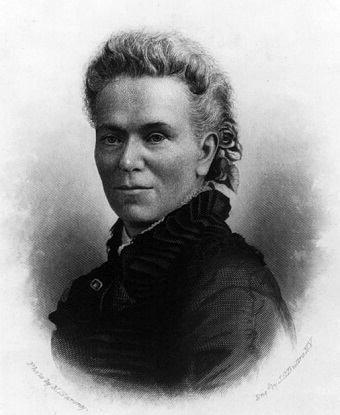Last updated: November 29, 2021
Person
Matilda Joslyn Gage

Courtesy of the Library of Congress, http://www.loc.gov/pictures/item/2003669989/
Matilda Joslyn Gage was a pioneering suffragist, abolitionist, and Native American rights advocate. One of the foremost theorists of the women's rights movement in the mid-1800s, she criticized organized Christianity for its role in the oppression of women.
Matilda Electa Joslyn was born in Cicero, New York in 1826. Her parents were abolitionists who prioritized her education. In 1845, she married Henry H. Gage. The couple had five children. Their home was a station on the Underground Railroad.
At the 1852 National Women’s Rights Convention in Syracuse, Gage made the first of what would be many public speeches. She quickly became a pillar of the women’s rights movement. In 1869, she co-founded the National Woman Suffrage Association (NWSA) with Elizabeth Cady Stanton and Susan B. Anthony. Gage organized suffrage groups in New York and Virginia and worked as a writer and editor for NWSA’s suffrage publications, including the History of Woman Suffrage. Although this chronicle is extensive, it largely excludes suffragists who were also women of color.
Gage also took direct action to claim her rights. In 1871, she organized several women to attempt to vote in her home of Fayetteville, New York. In 1886, she led a protest at the unveiling of the Statue of Liberty in New York City. The protesters argued that it was hypocritical to depict “liberty” as a woman when actual American women were denied political and social rights.
Gage was one of the more radical theorists of the women’s rights movement. Throughout her life she criticized organized Christianity, which she believed played a central role in the oppression of women. “The most stupendous system of organized robbery known has been that of the church towards woman,” she wrote in 1893, “a robbery that has not only taken her self-respect but all rights of person; the fruits of her own industry; her opportunities of education; the exercise of her own judgment, her own conscience, her own will.” These views put her at odds with many suffrage leaders. When the NWSA merged with the more conservative American Woman Suffrage Association (AWSA) in 1890, Gage left the group in protest.
Gage also advocated for Native Americans’ rights. She criticized the U.S. government for failing to respect treaties and for the brutal oppression of Native people. She also wrote admiringly about matriarchal forms of power, highlighting women’s political power within the Haudenosaunee (or Iroquois) Confederacy. She spent time with the Haudenosaunee, and in 1893, the Wolf Clan of the Mohawk Nation offered her an honorary adoption.
Matilda Joslyn Gage’s ideas also entered American culture in an unexpected way. In 1882, her daughter Maud married a struggling artist named L. Frank Baum. He would go on to achieve fame as the author of The Wonderful Wizard of Oz and its many sequels. Baum was most likely influenced by Gage’s ideas about female power and matriarchy when creating a world ruled by women. His ideas about witches nod to Gage’s research on the history of the stereotype from her 1893 book Woman, Church and State.
Gage died in 1898 at the age of 71. Her gravestone in Fayetteville Cemetery carries one of her lifelong mottos: “There is a word sweeter than mother, home, or heaven—that word is liberty.”
Bibliography
“About Gage.” Matilda Joslyn Gage Foundation. https://matildajoslyngage.org/
Dean, Michelle. “What ‘Oz’ Owes to Early Radical Feminism.” The Nation, March 8, 2013. https://www.thenation.com/article/archive/what-oz-owes-early-radical-feminism/
Gage, Matilda Joslyn. Woman, Church and State, 1893. http://www.gutenberg.org/files/45580/45580-h/45580-h.htm
Wagner, Sally Roesch, ed. The Women’s Suffrage Movement. New York: Penguin Classics, 2019.
Article by Ella Wagner, Cultural Resources Office of Interpretation and Education.
